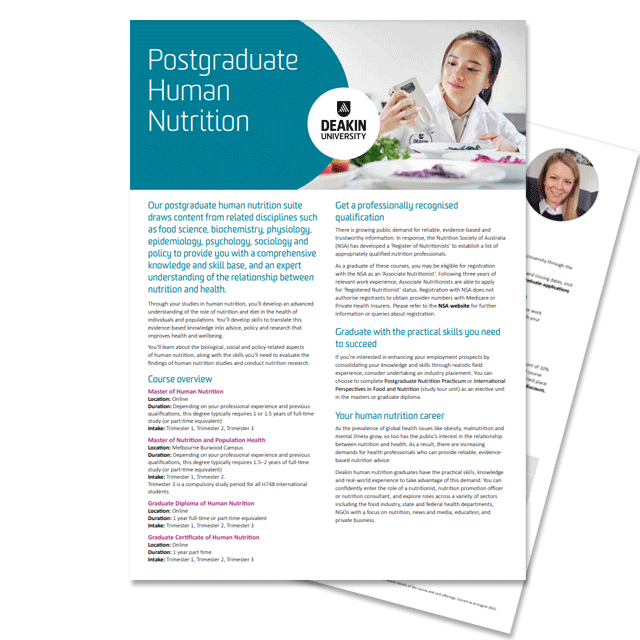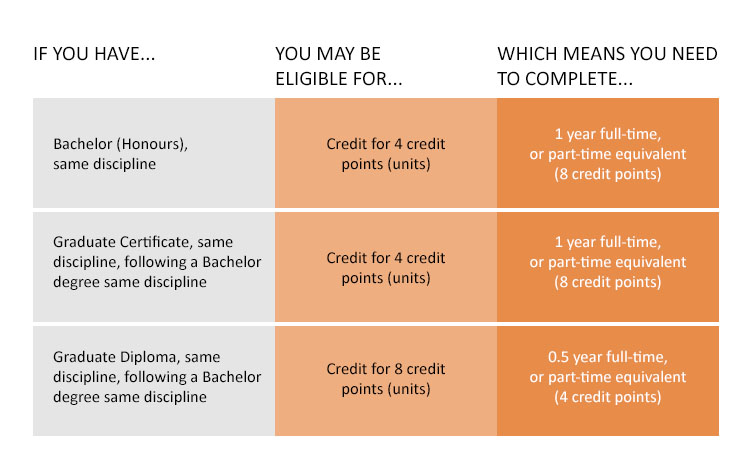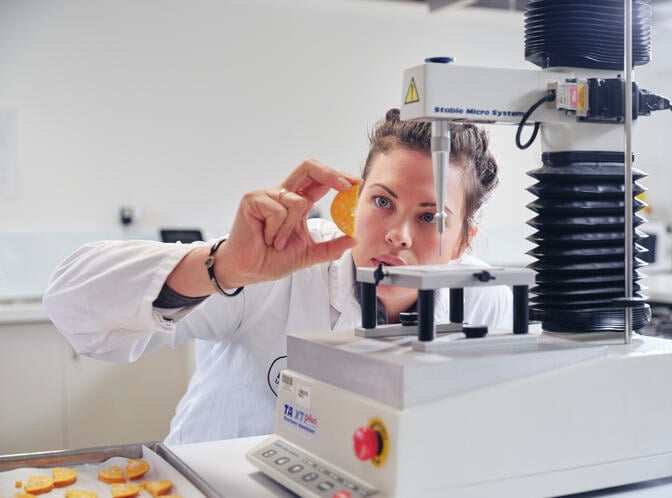Key facts
Duration
Locations
Key dates
Direct applications to Deakin for Trimester 2 2024 close 23 June 2024
Direct applications to Deakin for Trimester 3 2024 close 27 October 2024
Current Deakin Students
To access your official course details for the year you started your degree, please visit the handbook
Course overview
Learn the skills to work effectively as a nutritionist in a range of employment settings.
Deakin’s Master of Human Nutrition draws content from related disciplines such as food science, biochemistry, physiology, epidemiology, psychology, sociology and politics and policy.
In this course, you will develop an advanced understanding of the role of nutrition and diet in the health of individuals and the population. You will also learn about the biological, social and policy related aspects of human nutrition along with skills to evaluate the findings of human nutrition studies and undertaking research.
This course also provides you with the opportunity to undertake a diverse range of elective study options, giving you the ability to pursue topic areas that align with your interests and career aspirations.
Read MoreCourse information
- Award granted
- Master of Human Nutrition
- Year
- 2016 course information
- Deakin code
- H714
- Level
- Higher Degree Coursework (Masters and Doctorates)
Course structure
To complete the Master of Human Nutrition students must attain 12 credit points comprising:
- 6 core units (these are compulsory) worth 1 credit point each
- 6 credit points of electives (units worth 1 or 2 credit points, 6 credit points in total).
- At least 4 of the 6 elective credit points must be selected from the Nutrition elective list included in the course structure.
- Up to 2 credit points may be chosen from postgraduate units offered by any faculty of the University (subject to unit rules and approval by the course director).
- Option A: 1 additional core unit in research and 5 electives (6 credit points in total)
OR
- Option B: 2 additional core units in research (totalling 4 credit points) and 2 electives (6 credit points in total).
For students completing both a postgraduate human nutrition course (H511 or H714) and the Graduate Certificate of Public Health Nutrition (H517), a maximum of 2 credit points of credit for prior learning can be shared between both awards.
Core units
Course structure applies for students who commenced in 2015 onwards. Students who commenced prior to 2015 should refer to previous online Handbooks or consult your course enrolment officer.
From 2015 onwards, students who completed an undergraduate degree from a non-cognate area and have completed H511 Graduate Certificate of Human Nutrition, will be granted preclusions for HSN701, HSN702, HSN749 and HSN735.
From 2015 onwards, students who have previously completed an undergraduate degree in the cognate area and have completed H511 Graduate Certificate of Human Nutrition, will be granted credit for prior learning for HSN701, HSN702, HSN749 and HSN735.
Trimester 1
Trimester 2
Trimester 3
AND
Research Based Project Option A
Trimester 3
Students would need to complete an additional 5 elective units to complete the 12 credit points for the H714 Master of Human Nutrition.
OR
Research Based Project Option B
Trimester 1
Trimester 2
Students would need to complete an additional 2 elective units to complete the 12 credit points for the H714 Master of Human Nutrition
Elective units
Trimester 1
Trimester 2
Trimester 3
Intakes by location
The availability of a course varies across locations and intakes. This means that a course offered in Trimester 1 may not be offered in the same location for Trimester 2 or 3. Check each intake for up-to-date information on when and where you can commence your studies.
Trimester 1 - March
- Start date: March
- Available at:
- Cloud (online)
Trimester 2 - July
- Start date: July
- Available at:
- Cloud (online)
Trimester 3 - November
- Start date: November
- Available at:
- Cloud (online)
Additional course information
Workload
As a student in a Cloud (online) course in the Faculty of Health you will be expected to spend 11-13 hours every week studying, interacting via CloudDeakin and completing assessment tasks for each unit in your course.

Take the next step to a brighter future
Kickstart your career growth. We'll prepare you for the career you've always wanted.
Download course guideEntry requirements
Recognition of prior learning
The University aims to provide students with as much credit as possible for approved prior study or informal learning which exceeds the normal entrance requirements for the course and is within the constraints of the course regulations. Students are required to complete a minimum of one-third of the course at Deakin University, or four credit points, whichever is the greater. In the case of certificates, including graduate certificates, a minimum of two credit points within the course must be completed at Deakin.
You can also refer to the Credit for Prior Learning System which outlines the credit that may be granted towards a Deakin University degree.
Fees and scholarships
Fee information
Learn more about fees and your options for paying.
Commonwealth supported place (CSP)
Under the present legislation, a Commonwealth supported place is one for which the University receives some Government funding. Students enrolled in these places are required to contribute part of their course costs. To be eligible for a Commonwealth supported place you must be an Australian citizen, or New Zealand citizen or holder of a permanent visa who will be residing in Australia for the duration of your study.
The Commonwealth Supported Place (CSP) indicative course fee shown in the table above is provided as a guide only. It has been calculated on the basis of a typical enrolment of a student undertaking the course in 2015, and reflects the cost involved in undertaking full-time study within the specified discipline. The actual fees charged by Deakin University, will depend on the individual unit discipline and may vary from the indicative course fee cited, particularly if units are chosen from a number of disciplines. The cost of each unit offered in 2016 can be viewed from the Unit Search.
Full-fee paying place
A full-fee paying place is one which the University does not receive any Government funding. Students enrolled in these places contribute the full cost of their course. Domestic full-fee paying places are available to Australian citizens, New Zealand citizens or holders of a permanent visa.
The actual course fee charged by Deakin University, is based on the course and the study load being undertaken. The annual fee above is based on eight credit points (which equals one Equivalent Full Time Study Load - EFTSL). If your study load for the year is less than or more than eight credit points, your fees will be adjusted accordingly. The credit point and EFTSL value of each unit can be viewed by looking up your units in the Handbook Unit Search. To calculate the fee for each unit, take the applicable course fee above, divide it by eight, then multiply it by the credit point of the unit you are studying.
Fee information for all domestic students
The fees per course/unit/credit point may be otherwise subject to an annual increase due to rises in the cost of course delivery and service.
This information is provided as a guide only. No representation is made that the information provided is current or accurate. Deakin assumes no responsibility for persons relying on indicative course fee to calculate the total future cost of their course. Applicants can email enquire@deakin.edu.au for more information about 2016 fees.
Study load
Eight credit points is considered a standard full time load for one year, which equals one Equivalent Full Time Study Load - EFTSL. The annual fee displayed for this course is based on eight credit points.
Fee payment assistance
Australian citizens or holders of a permanent humanitarian visa, enrolling in a CSP or full-fee paying place, may be eligible for HECS-HELP or FEE-HELP respectively. For more information about HECS-HELP or FEE-HELP visit the Study Assist website.
FEE-HELP calculator
What is FEE-HELP?
FEE-HELP loans cover up to 100% of tuition fees for eligible students. By taking out a FEE-HELP loan, the government pays your tuition fees directly to Deakin, and the balance is repaid from your employment income - but only once you're earning over $51,550.
Please note: fees shown by the calculator are indicative only and based on 2024 rates. Actual fees may vary. We advise confirming fees with Prospective Student Enquiries prior to enrolment.
Estimate your FEE-HELP
FEE-HELP payments
per pay cycle
Take-home pay
after FEE-HELP and tax
per pay cycle
Your estimated FEE-HELP repayments
- $* is the estimated full cost for a Master of Human Nutrition (12 credit points), based on the 2024 fees.
- is the annual FEE-HELP payment, based on your current salary
- of your current salary be spent on FEE-HELP
*Disclaimer
Deakin University (Deakin):
- gives no warranty and accepts no responsibility for the currency, accuracy or the completeness of the information provided;
- advises users that no reliance should be placed upon on the information provided, and;
- instructs users that they should confirm the actual course fee with Prospective Student Enquiries prior to enrolment.
This tool provides indicative information about the fees that will be payable in respect of courses and subjects offered to prospective students domiciled in Australia during the periods indicated.
Please note that the fees shown by the calculator are indicative only and actual fees may vary. Users are advised to confirm the actual course fee with Prospective Student Enquiries prior to enrolment.
The estimated course fee is based on the tuition fee costs applicable to a domestic full time student commencing the course in Trimester 1 and studying full time for the duration of the course but:
- does not include non-tuition costs that may apply, such as Student Services and Amenities Fees (SSAF);
- does not take into account any scholarships or bursaries awarded to the student (including the 10% Deakin alumni discount);
- assumes the maximum number of units that need to be successfully completed actual number completed may be reduced if recognition of prior learning is granted;
- assumes that no exceptional, or non-typical, circumstances apply to the proposed course of study;
- assumes that the options that the user selects are appropriate for the course of study that they intend to undertake;
- where fees are estimated for future years those fee will be subject to annual increases in accordance with increases in the cost of course delivery.
Scholarship options
A Deakin scholarship might change your life. If you've got something special to offer Deakin – or you just need the financial help to get you here – we may have a scholarship opportunity for you.
Postgraduate bursary
If you’re a Deakin alumnus commencing a postgraduate award course, you may be eligible to receive a 10% reduction per unit on your enrolment fees.
Apply now
Some of our courses have limited places available - for the latest on courses still open for application, visit Courses by trimester.
Create an account in the Deakin Application Portal, start your application, enter personal details, education experience, upload supporting documents and submit. Need help? Play this video, or contact one of our friendly future student advisers on 1800 693 888 or submit an online enquiry.
For more information on the application process and closing dates, see the How to apply webpage. If you're still having problems, please contact us for assistance.
Entry pathways

Tap image to expand
Duration of H714 will be 8-12 credit points based on past experience and qualifications, recognition for prior learning will be assessed on a case by case basis.
Alternative exits
- Graduate Certificate of Human Nutrition (H511)
- Graduate Diploma of Human Nutrition (H616)
Contact information
Health - Student and Academic Services
Tel 03 9251 7777
health-enquire@deakin.edu.au
Professional recognition
Growing public interest in the relationship between diet and health is evident and, as a result, there are increasing demands from the public for reliable and trustworthy information. In response, the Nutrition Society of Australia (NSA) has developed a ‘Register of Nutritionists’ to establish a list of appropriately qualified nutrition professionals.
As a graduate of this course, you may be eligible for registration as an ‘Associate Nutritionist’. Following three years of relevant work experience, Associate Nutritionists are able to apply for ‘Registered Nutritionist’ status. For details about the registration process, please refer to the Nutrition Society of Australia website.




